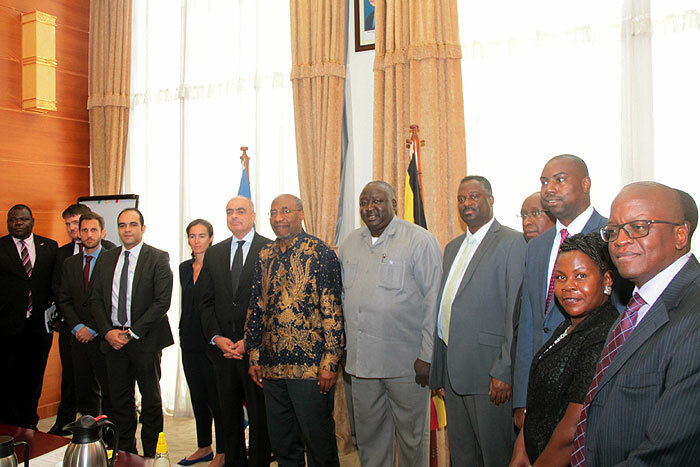Rugunda meets UN sanctions team on DRC
The PM tells the team Uganda and partners are working towards fostering a secure and stable DRC.
Prime Minister Dr. Ruhakana Rugunda has met a delegation of the UN Security Council Sanctions Committee on the DR Congo as efforts to turn screws on destabilizing forces in DRC pick steam.
Over the years, armed groups like Democratic Forces for the Liberation of Rwanda (FDLR), the Allied Democratic Forces (ADF) and the Lord's Resistance Army (LRA) have made a home in DRC's sprawling jungles - causing a humanitarian crisis through displacing thousands of people.
Led by Abdellatif Aboulatta, the delegation was composed of Security Council members from Spain, Egypt, France and New Zealand.
Aboulatta is Egypt's Ambassador to the UN since 2014 and is the chair of the UN Security Council Counter-Terrorism Committee.
The Sanctions Committee is a subsidiary body of the UN Security Council, comprising of all 15 members, tasked with monitoring the implementation of specific UN Security Council Resolutions.
Nearly two months ago, Security Council extended its arms embargo, asset freeze and travel ban on DRC until 1 July 2017 and the mandate of the Expert Group assisting the Sanctions Committee through 1 August 2017.
However, the Council made it explicitly clear that those measures no longer applied to the supply, sale or transfer of arms and any related material to the DRC Government.
Also, the sanctions do not apply to the provision of support to the United Nations Organization Stabilization Mission in the Democratic Republic of the Congo (MONUSCO) or the African Union Regional Task Force.
Among other provisions, the Council requested that the Group of Experts gather and analyse information regarding the regional and international support networks to armed groups, supply and transfer of arms, and perpetrators of serious violations of humanitarian law.

The Security Council also demanded that FDLR, ADF, LRA and other armed groups in DRC cease all forms of violence and exploitation of DRC's vast natural resources which they use to fuel their ruinous armed activities.
The Council likewise ordered DRC to continue enhancing stockpile security, accountability and management of arms and ammunition, and urgently implement a national weapons-marking programme.
It similarly called on DRC to pursue its action plan to end sexual violence and violations committed by its armed forces, and address issues of the use of children in armed conflict, illegal exploitation and smuggling of natural resources.
Rugunda told the UN delegation that Uganda and other regional partners are working towards fostering a secure, stable and prosperous DRC.
As evidenced by last week bilateral summit in Kasese between President Yoweri Museveni and his DRC counterpart, Joseph Kabila, Rugunda said Uganda is keen to deepen cooperation with DRC in different areas of mutual interest.
Rugunda, with state minister for foreign affairs, Okello Oryem in tow, highlighted the need by UN Group of Experts to appreciate the ongoing constructive engagement over the situation in DRC at a bilateral and regional issue.
The UN delegation will also visit DRC and Rwanda - two other countries, who, alongside Uganda have borne the brunt of the armed groups targeted by the sanctions.